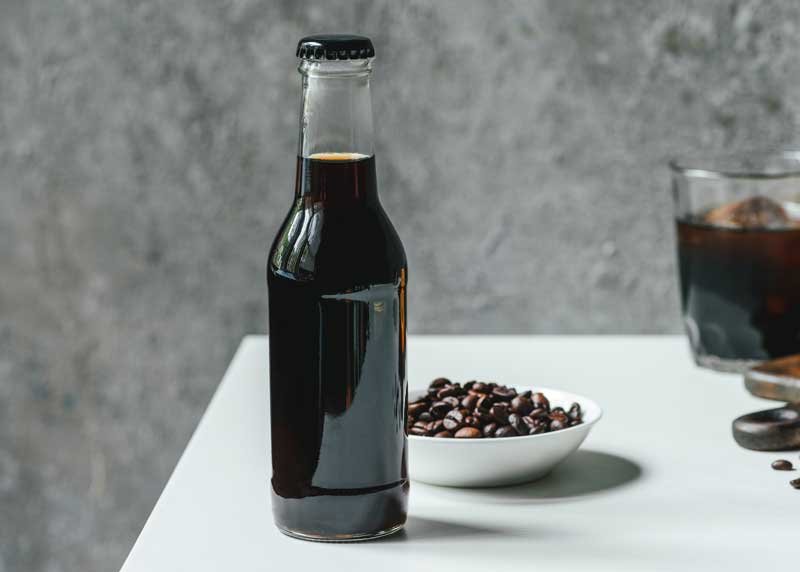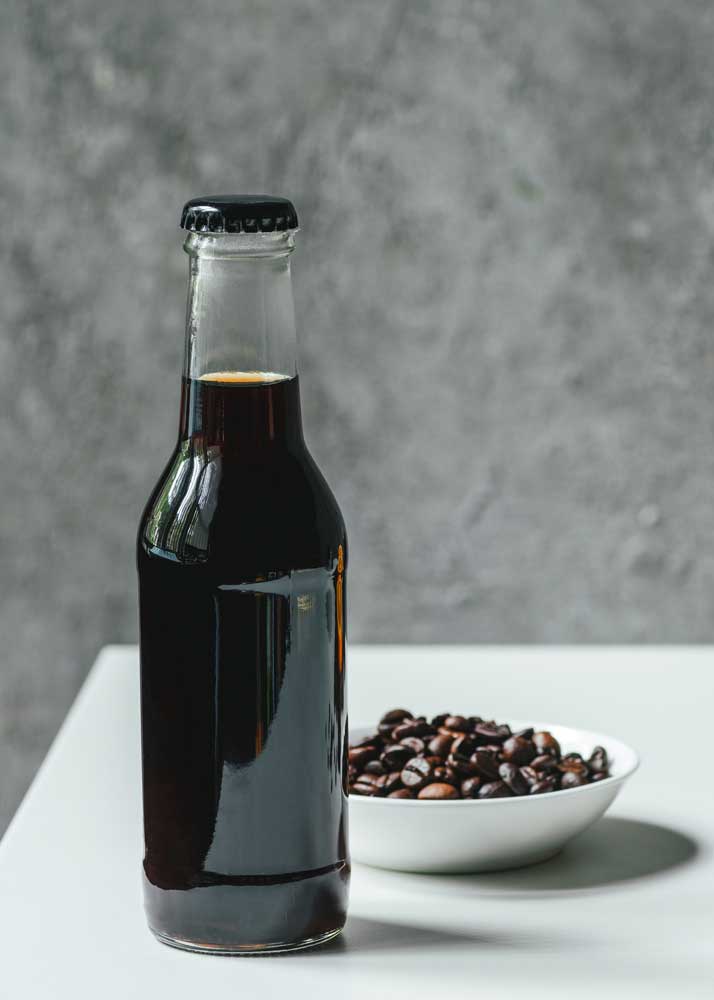Coffee kombucha is a healthy way to start your day. In this post, you’ll learn how to make coffee kombucha. Plus all about its health benefits. Does it have caffeine, probiotics, or alcohol?
Coffee kombucha is a combination of caffeine, probiotics, and B vitamins. This simple coffee kombucha recipe also comes with a variety of benefits. Here are the basic ingredients in coffee kombucha:
- Two quarts of freshly brewed coffee (plain or flavored)
- Half a cup of sugar
- Kombucha scoby (more on this below)

This is the ultimate multi-tasking drink, with coffee for energy and kombucha for the extra nutrients.
Before we get to the full recipe, What is koffucha? This is a cute, fairly unknown term that has combined coffee + kombucha = koffucha. I don’t know about it but wanted to include this, in case you see koffucha being used.
Easy Coffee Kombucha Recipe
The steps to make coffee kombucha are quite simple.
They include:
- Get a large ceramic or glass container
- Pour the kombucha scoby drink in until it reaches a little more than halfway.
- Pour the coffee through the strainer and add sugar
- Allow the sugar to dissolve in the hot coffee
- Mix kombucha into coffee, stir it together for two minutes
- Let mixture cool until it’s at room temperature
- Make sure the mixture doesn’t have any leftover coffee grounds
- Ferment the mixture undisturbed at room temperature away from direct sunlight for at least a week
After about a week, start having little sips of the kombucha every day until the mixture tastes good to you. If it tastes too bitter or sour, then the mixture has gone bad, and you’ll have to start over.
What is SCOBY?
SCOBY is an acronym for “symbiotic culture of bacteria and yeast”.
It refers to the gelatinous biofilm layer used in fermentation processes, like kombucha and sourdough starters. The layer is also known as a pellicle.
Noma’s Original Coffee Kombucha Recipe
For something a little different, here’s how to make coffee kombucha following Noma’s recipe. Noma is located in Denmark and is listed as one of the world’s best restaurants.
How Does Coffee Kombucha Taste?
If coffee kombucha sounds like the most delicious drink in the world to you, then this description might not be what you wanted to hear.
The most common description of what coffee kombucha tastes like is somewhere between tasting like apple cider vinegar gone bad and tasting like straight-up regular vinegar.
The taste all depends on how long you ferment it for.
- If you ferment it for five to seven days, it’s going to have more of a sweet taste and be a little tart.
- If you ferment it for eight to ten days, you’re going to get more of the apple cider vinegar taste.
If you ferment it for longer, it will most likely go sour and not taste good. Fermenting it for the recommended five to seven days will produce the best-tasting coffee kombucha.
How to Sweeten Coffee Kombucha
Fortunately, there are ways to make it taste a bit better. The most common way is to keep adding sugar until it’s sweet enough, but this method counteracts the healthy aspect of the coffee kombucha.
Other ways to make your coffee kombucha a little sweeter include:
- Using a flavored coffee, such as vanilla or hazelnut
- Adding a spoonful or two of maple syrup to the recipe
- Placing cardamom pods on top of the liquid and sealing it inside the bottle or container, letting it fizz while the mixture ferments
Whatever the method, keep in mind the main reason to drink coffee kombucha is for the health benefits, not the taste.
For more ideas, here are 19 ways to sweeten coffee without sugar.
4 Health Benefits of Coffee Kombucha
Coffee kombucha is absolutely packed with health benefits.
These include:
- Less caffeine, when compared to similar-sized, traditional coffee. (Source)
- Source of nutrients, antioxidants, and energy (Source)
- Source of probiotics and B vitamins (Source)
- Lower fluoride levels, when compared to traditional tea-based kombucha. (Source)
As with anything relating to your health, you should consult with your medical provider to confirm that what you plan to consume will not have negative effects on your health.
Dietitian Explains Kombucha Health Benefits
In this video by Well+Good, Dietitian Tracy Lockwood Beckerman reviews the benefits of drinking kombucha.
7 Benefits of Drinking Less Caffeine
Even though you use straight coffee in the recipe, coffee kombucha actually has less caffeine compared to regular coffee.
The coffee is actually modified and consumed by microorganisms during the fermentation process. The coffee is somewhat naturally decaffeinated and is only left with about five to six grams of caffeine.
The advantages of drinking less caffeine include:
- Sleep better
- May reduce anxiety
- Healthier and whiter teeth
- Lower blood pressure
- May contribute to weight loss
- Better nutrient absorption
- Feel more awake
Source of health benefits: nib group
6 Benefits of Probiotics
Probiotics are good microorganisms that aren’t affected by fermentation. In fact, they are part of the fermentation process. And it’s a good thing, too, since probiotics are extremely helpful to your overall health.
Some of the benefits of probiotics include:
- Improving intestinal health. Probiotics help break down food molecules into smaller compounds, and that makes it easier for the body to digest and absorb the nutrients the food provides
- Antioxidant properties. They can help reduce or treat diarrhea that was induced by antibiotics, but it can help with other types of diarrhea as well
- Improving many bodily functions, such as cell growth, mental health, metabolism
- Enhance the body’s immune response, making your body better at fighting off harmful bacteria and preventing diseases caused by that harmful bacteria from having such a huge impact on your health
- Reducing blood cholesterol
- Preventing or lowering your chances of getting cancer
Source for probiotic benefits: health.harvard.edu
Reduced Fluoride
Fluoride isn’t just in toothpaste; it’s also a fairly prominent component in regular, tea-based kombucha.
Fluoride can negatively affect the body by making the chances of getting cancer or diabetes much higher. You already receive a fair amount of fluoride from other things, including toothpaste, most fruit drinks, regular coffee, most fruits and vegetables, and seafood. A healthy amount of fluoride can be beneficial but cutting its consumption where possible will serve you better in the long run.
Should you worry about the fluoride in tea-based kombucha? No. According to Nourished Kitchen, there is no need for concern “unless you’re drinking several quarts of kombucha made with strong, cheap tea, there’s no need to worry.”
Is there Alcohol in Coffee Kombucha?
Yes, there is a small amount of alcohol in coffee kombucha. It’s natural to expect this because the fermentation process isn’t that much different from the process used to create most alcohol varieties. But there isn’t nearly enough alcohol in coffee kombucha to affect you significantly.
According to Bon Appetit, “Most brands on shelves today contain just a fraction of alcohol—less than .5% ABV—allowing them to be sold as non-alcoholic beverages under the guidelines of the Alcohol and Tobacco Tax and Trade Bureau.”
So while many commercial brands have less than .5% alcohol, this isn’t exclusively true. And if you are making it at home, the alcohol content will be highly variable.
The yeasts that are already present in the kombucha drink ferment the recipe’s sugar and turn it into something called ethanol. Ethanol is the chemical that makes alcohol feel and taste like alcohol. But a large part of the ethanol that’s produced is oxidized into acetic acid, which is the acid found in vinegar. This is what gives coffee kombucha its vinegar-like taste.
More reading: How to Make Coffee (17 Best Brew Methods)
How Long Does Coffee Kombucha Last?
Depending on how long you ferment it, coffee kombucha can last anywhere between seven and ten days.
This time frame doesn’t include the seven-day fermentation process, so once the mixture reaches a taste that’s suitable for you, it’s recommended that you place the coffee kombucha container into the fridge as soon as possible.
Keeping it cool and in a tightly sealed storage container will make it harder for bacteria to enter, and the drink will last longer. The natural oils in coffee also help to keep it tasting fresh for longer.
So once the fermentation process is done, just make sure you drink it often enough that you’ll get the most out of it before it starts turning sour.
More reading: How long does coffee last?

Keep reading: How much potassium is in coffee? (Regular, Decaf, Instant Compared)
Coffee Kombucha, Anyone?
Coffee kombucha is definitely an acquired taste, similar to coffee in general. When you first start drinking it, it’s advisable to start with small quantities and have something sweeter nearby to wash it down with.
But once you drink it enough, coffee kombucha can start tasting better and you won’t need an alternative choice in order to stomach it.
Have a question or tip for making great coffee kombucha? Join me in the comments!
- About the Author
- Latest Posts
Bryan Haines is a co-founder and writer on EnjoyJava – and is working to make it the best coffee blog in the world.
He is a travel blogger at Storyteller Travel and blogs about photography at Storyteller Tech. He is also co-founder of Storyteller Media, a company he started with his wife, Dena.
